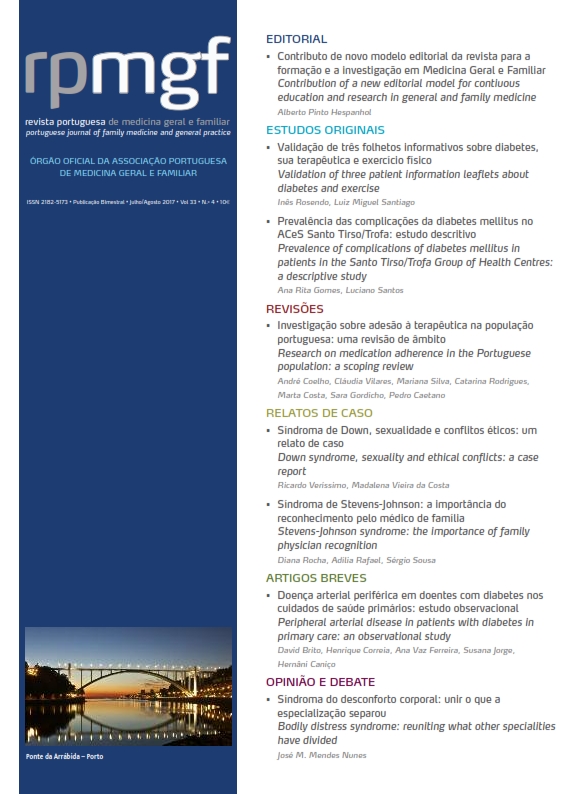Down syndrome, sexuality and ethical conflicts: a case report
DOI:
https://doi.org/10.32385/rpmgf.v33i4.12227Keywords:
Down syndrome, Intellectual disability, Sexuality, Ethics, General practitioner.Abstract
OIntroduction: Down syndrome is the most common genetic cause of intellectual disability. Although sexual desire is present, irrespective of the degree of impairment, many families play an overprotective role, treating affected individuals as children and as asexual persons. This may create gaps in their sexual education, increasing their vulnerability to assault and to risk behaviours. This report stresses the importance of sexual education for individuals with intellectual disability and draws attention to ethical matters, which may emerge in this context. Case description: A 22 year-old woman with the Down syndrome and no other significant past medical history came alone to a family planning appointment after starting a new relationship. She had already had sexual intercourse, although not with her current boyfriend. She was not aware of contraceptive methods, stating that, when it was used in her sexual contacts, it was on the initiative of her partners. She had consented to all sexual contacts but stated that she had felt mistreated once. After the presentation of several contraceptive options, she showed interest in subcutaneous implants. She was informed about the importance of preventing sexually transmitted diseases and about the correct use of condoms. A cervical cytology smear was performed. Since it was difficult to assess the capacity of this young woman to give informed consent, her mother was contacted. She stated that consent should be given by the patient, but was willing to help in informing her daughter about her options. Nothing was revealed to the mother about her daughter’s sexual life. Following a negative pregnancy test, a subcutaneous device was implanted. The need for correct use of condoms was repeated. Three months later, she returned for a follow-up family planning appointment, including a repeat evaluation of her status and further counselling on sexual and reproductive health. Comment: The health care team faced two challenging ethical questions in this case. Does intellectual disability render this woman incapable of giving informed consent? Could confidentiality be waived to allow her mother to increase her awareness of the need for contraception and to give informed consent? Health care professionals can empower parents to promote sexual health in individuals with intellectual disability including Down syndrome. The family doctor has a role to play in this effort.Downloads
Downloads
Published
Issue
Section
License
The authors will assign to the RPMGF the sole right to publish and distribute the content of the manuscript specified in this declaration via physical, electronic, broadcasting or any other medium that may come into existence. They also grant the RPMGF the right to use and exploit this manuscript, in particular by assigning, selling or licensing its content. This permission is permanent and takes effect from the moment the manuscript is submitted, has the maximum duration allowed by applicable Portuguese or international law and is of worldwide scope. The authors further declare that this assignment is made free of charge. If the RPMGF informs the authors that it is not going to publish their manuscript, the exclusive assignment of rights ceases forthwith.
The authors authorise the RPMGF (or any entity it may appoint) to act on their behalf when it believes that copyright may have been infringed.





